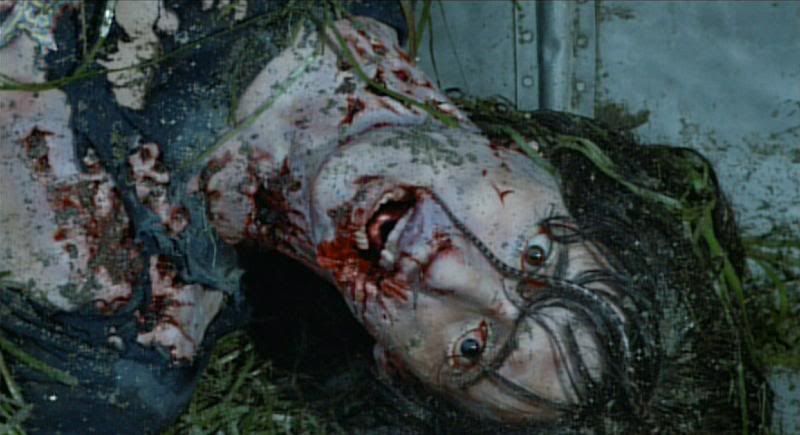 I thought I'd start off with something considered a classic, but not something too well known. (Spoiler Alert, btw).
I thought I'd start off with something considered a classic, but not something too well known. (Spoiler Alert, btw).Sleepaway Camp was written and directed by Robert Hiltzik, starring Felissa Rose and Jonathan Tiersten. (http://www.imdb.com/title/tt0086320/)
First of all, I like slasher movies. They just rock, despite the many problems inherent in the genre, and this one is a perfect example. The politics behind this movie made it hard for me to enjoy in retrospect, though I was riveted while it was on-screen.
I can't deny that some of the kills were effective, even if they seem a bit old-school now. I mean, getting scalded while trying to boil corn is a bit less impressive than the gore of the torture-porn genre. However, what made these kills frightening was that they left something to the imagination. There was a lot of shadow work and shots of grasping hands, with a few well-done shots of the dead body thrown in as well. Much of the kill is not actually shown on-screen.
 This means that, rather than squirming away from something that is graphically depicted, the viewer's mind has to fill in the gaps, which is always so much worse, or better if one prefers. The viewer didn't have to physically see Judy, the camp mean girl, get violated with a curling iron, the shadow on the wall was enough.
This means that, rather than squirming away from something that is graphically depicted, the viewer's mind has to fill in the gaps, which is always so much worse, or better if one prefers. The viewer didn't have to physically see Judy, the camp mean girl, get violated with a curling iron, the shadow on the wall was enough.Judy's death, to me, sums up her status in the movie. It is a symbol of femininity, a curling iron, that kills her. Overall, she exists only to be the Whore in contrast to Angela, the almost-mute new camper's, initial status as Virgin. When she first really attacks Angela in the cabin they share, she focuses on her body. She asks why Angela showers alone, and speculates as to if she's reached puberty yet. To Judy, this is the most insulting thing she can say to Angela. Judy's status at the camp focuses directly around her body, as do all the girls'. Angela's failure to fit into their concept of girlhood enrages them. Most of Judy's interactions with Angela consist mainly of Judy screaming into Angela's passive face, though this may just be a result of bad acting.

The "twist" ending held just as much gender bias. Angela is reveled as being male, and the killer to boot. The end scene, especially Angela's bug-eyed expression, is creepy, but the underlying morals are creepier. Angela's true crime is not conforming to society's gender roles.
Her motivation for killing is apparently not the horrible accident that killed her father and brother, which was caused by careless campers, but instead being raised as a girl by her aunt, who it seems was transgendered and preferred to have a girl child. This experience, though it would be confusing to a child in real life, is positioned as so inherently traumatic as to turn someone into a psycho killer.
It also seems that the end shot provided the genesis of all the J-Horror screaming ghost children, as Angela could easily be transported into The Grudge during this shot. If this is good or bad, that's personal preference.
Overall:
The Film Itself: B
The Film's Politics: D-
No comments:
Post a Comment